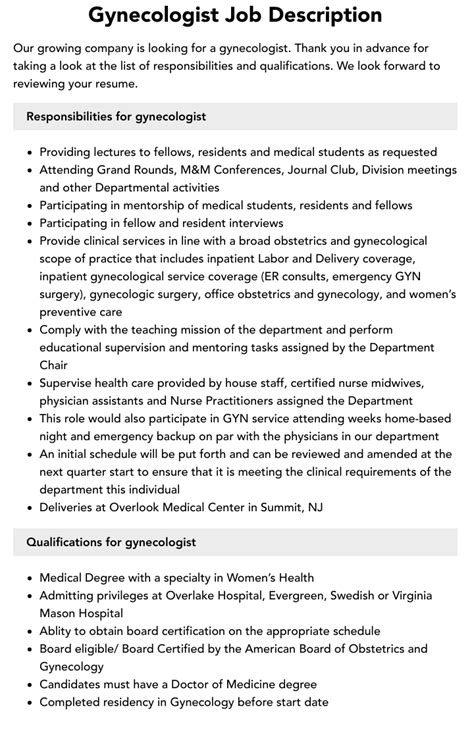Overview
Gynecologists are medical professionals who specialize in the female reproductive system, including the uterus, cervix, vagina, and ovaries. They provide a wide range of services, from routine checkups and prenatal care to surgeries and treatments for conditions such as endometriosis and infertility.

Responsibilities
The responsibilities of a gynecologist typically include:
- Providing routine gynecological care: This includes performing pelvic exams, Pap smears, and breast exams, as well as providing counseling on contraception, sexual health, and menopause.
- Diagnosing and treating gynecological conditions: Gynecologists can diagnose and treat a variety of conditions, including infections, fibroids, ovarian cysts, and cancer.
- Performing gynecological surgeries: Gynecologists may perform a variety of surgeries, including hysterectomies, oophorectomies, and cesarean sections.
- Providing prenatal care: Gynecologists provide prenatal care to women who are pregnant, including monitoring the mother’s health, performing ultrasounds, and delivering the baby.
Qualifications
To become a gynecologist, you must:
- Earn a bachelor’s degree: The most common undergraduate degrees for gynecologists are biology, chemistry, or pre-medicine.
- Attend medical school: Medical school takes four years to complete. During this time, you will learn about the human body, diseases, and how to diagnose and treat them.
- Complete a residency in obstetrics and gynecology: A residency in obstetrics and gynecology typically takes four years to complete. During this time, you will gain experience in all aspects of gynecological care.
- Become certified by the American Board of Obstetrics and Gynecology (ABOG): ABOG certification is required to practice gynecology in the United States.
Work Environment
Gynecologists typically work in hospitals, clinics, or private practices. They may work regular hours or on-call hours, including evenings and weekends.
Salary
The median annual salary for gynecologists is $208,000. The salary range for gynecologists is $160,000 to $265,000.
Job Outlook
The job outlook for gynecologists is expected to be good over the next few years. The number of women seeking gynecological care is expected to increase as the population grows and women live longer.
Why Become a Gynecologist?
There are many reasons why becoming a gynecologist is a rewarding career. Gynecologists:
- Make a difference in the lives of women: Gynecologists play a vital role in maintaining women’s health and helping them to live long, healthy lives.
- Have a variety of job opportunities: Gynecologists can work in a variety of settings, including hospitals, clinics, and private practices.
- Earn a good salary: Gynecologists earn a competitive salary.
FAQs
1. What is the difference between a gynecologist and an obstetrician?
A gynecologist is a doctor who specializes in the female reproductive system, while an obstetrician is a doctor who specializes in pregnancy and childbirth. However, many gynecologists also provide obstetric care.
2. How often should I see a gynecologist?
Most women should see a gynecologist once a year for a routine checkup. However, women who are pregnant or have certain medical conditions may need to see a gynecologist more often.
3. What should I expect during a gynecological exam?
During a gynecological exam, the doctor will ask you about your medical history and current symptoms. The doctor will then perform a physical exam, which includes a pelvic exam and a Pap smear.
4. What are the signs and symptoms of gynecological cancer?
The signs and symptoms of gynecological cancer can vary depending on the type of cancer. However, some common signs and symptoms include:
- Vaginal bleeding that is not related to your menstrual cycle
- Pelvic pain
- Abdominal pain
- Bloating
- Weight loss
- Fatigue
5. What are the risk factors for gynecological cancer?
The risk factors for gynecological cancer include:
- Age
- Family history of gynecological cancer
- Certain types of HPV infection
- Smoking
- Obesity
6. How can I prevent gynecological cancer?
There are a few things you can do to help prevent gynecological cancer, including:
- Get regular Pap smears
- Get vaccinated against HPV
- Maintain a healthy weight
- Exercise regularly
- Avoid smoking
7. What are the treatment options for gynecological cancer?
The treatment options for gynecological cancer depend on the type of cancer, the stage of the cancer, and the patient’s overall health. Treatment options may include surgery, chemotherapy, radiation therapy, and hormone therapy.
8. What is the prognosis for gynecological cancer?
The prognosis for gynecological cancer depends on the type of cancer, the stage of the cancer, and the patient’s overall health. However, many types of gynecological cancer are curable if they are caught and treated early.
